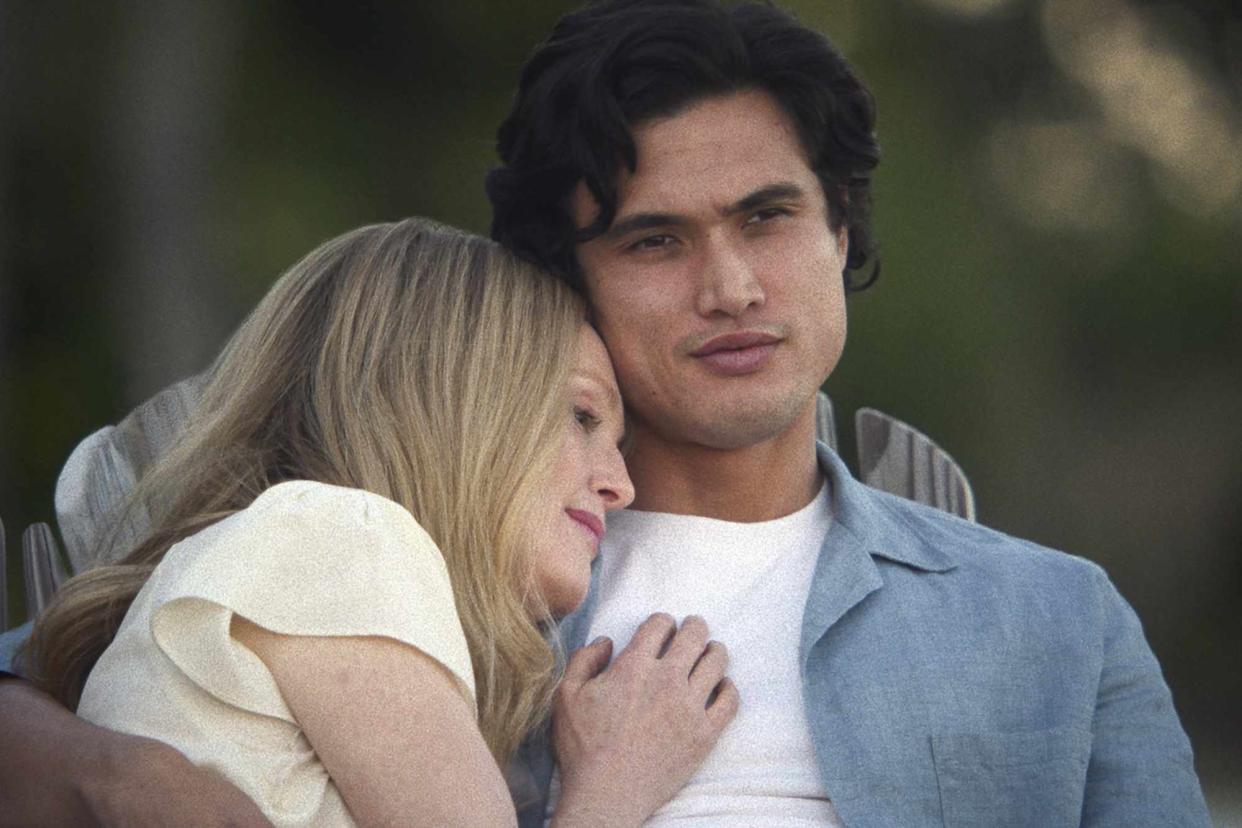Even Julianne Moore doesn't know the truth about Gracie in “May December”

- Oops!Something went wrong.Please try again later.
- Oops!Something went wrong.Please try again later.
"With anybody's history, people are often not aware or even conscious of what happened," the actress tells EW.
Warning: This article contains spoilers for May December.
Gracie Atherton-Yoo is a slippery creature.
So much so, that even Oscar-winner Julianne Moore doesn't have a lot of precise answers about the truth of her May December character's life.
Gracie was once a 1990s tabloid fixture for her sexual relationship with then 13-year-old Joe Yoo, but now Joe (Charles Melton) and Gracie are married with three children — until actress Elizabeth Berry (Natalie Portman) comes into their lives and starts poking holes in their carefully constructed veneer of happiness. Namely, Gracie believes that her relationship with Joe has been nothing but a love affair since the very beginning.
Elizabeth is given a particular shock when Gracie's son from her first marriage, Georgie (Cory Michael Smith) tells her that Gracie's brothers sexually abused her as a child. To Elizabeth, that is the key to Gracie's choices — until Gracie pulls the rug out from Elizabeth and denies that any of what Georgie said is true. Is Gracie or George the one who's lying?
"I don't know if Gracie even knows," reflects Moore. "That's the insidious thing about our pasts and trauma. This is a personal opinion, but I don't behavior is created out of a vacuum. There's cause and effect with everything. But with anybody's history, people are also not aware or even conscious of what happened."
That state of denial was key to Moore's portrayal of Gracie, something she said was useful for separating the character from her own thoughts about Gracie's actions. "When people say, 'Don't judge your characters,' what they mean is you can't be inside commenting on your character while you're playing them," she says. "As a human being, I can say that her actions are reprehensible. I would be crazy if I didn't think that. But as a character, she feels that she made a choice out of love and that she was rescued."
Moore talked to EW at length about reuniting with director Todd Haynes for their fifth feature film together (streaming now on Netflix), how she crafted Gracie's physicality to make her costar's life easier, and why she needed to infantilize Gracie.

ENTERTAINMENT WEEKLY: You've made more films with Todd Haynes than any other director you've worked with. What keeps you coming back?
JULIANNE MOORE: He's truly one of the greatest directors of our time. He's extraordinary with how he chooses to tell stories about what it is to be a human being and what identity means and how culture shapes us and who are we in the context of our times. Everything that he talks about in his films are things that I'm endlessly fascinated by. As an actor, he gives you so much scaffolding. He's always giving you a frame to work in. He has such a strong point of view, and he's really able to communicate that to me. I feel like he does all of the work, and I can just slot into it.
Gracie has this very infantilized way of being. What was the impetus for that?
It's really about the storytelling: What story is she telling in the world about who she thinks she is? It's like she's swallowed gender culture whole and considers herself to be an innocent — someone who may need protection from men, who had been trapped in her marriage and this place of feeling that she doesn't have any power. She felt she was rescued by a love affair, but the love affair was with a 13-year-old boy. For that story to make her the one who's being rescued, that little boy has to be a man, and that makes her a child. She says, "I am naive. I always have been." It's a willful denial. The distance between what actually happened, which is that she transgressed greatly, and the narrative that she's projecting to the world is vast. In this vastness, there's this huge amount of emotional volatility.
This story was loosely inspired by Mary Kay Letourneau. Did you do much research on her or borrow anything from her?
Of course, there are some details that are very similar, but it's not a portrait of that case. But I did read about the case, and I saw some of the documentaries and stuff too. [Screenwriter] Samy Burch is somebody who grew up in the '90s at the height of tabloid culture when so many of these stories were churned out as entertainment. It was interesting to read those and to think about how we gobble up these sensationalized stories. Then you wonder, "Well, what is the story?" We may never really know, because sometimes when you sensationalize these things, you take away the humanity.
Speaking of the tabloids, we see you as Gracie in a bunch of shots. Were those photoshopped images or old pictures of you?
Oh, we shot all of those. We had one afternoon to quickly do all these things. We had a bunch of cheap wigs and little half sets, and we were running from one thing to another.

courtesy netflix
Natalie Portman and Julianne Moore in 'May December'Natalie had to study and copy a lot of your mannerisms. Were there any things you noticed she did that you then made part of Gracie to make that an easier transition for her?
No, that's not how the game is played. But I needed to make some very strong choices physically early on so that Natalie would have stuff to copy — Gracie's hyper-femininity, the way she moves, these graceful movements with her hands. The lisp was something that I was messing around with early on. I called Todd and I was like, "Listen, I'm thinking about doing this because it gives Natalie something very concrete to copy." It was something that was emblematic of her feeling of being childlike.
We never really get a clear sense of what Gracie's relationship with her son from her first marriage is like. What do you think it is?
I don't know. Gracie thinks that it's good. You'd have to ask Michael Corey Smith what he thinks. Gracie says, "Of course, I see all of my kids." They all continue to live in the same town and go to the same schools. So who knows what the real story is, but she feels comfortable enough to be involved with all of them and in everybody's life.
She turns the tables on Elizabeth at the end, but do you think that's purposeful or subconscious?
I don't know. People's behavior, often, they want to be some way and they end up being another. Are we in control of our actions? Or is some subconscious thing taking over? Gracie is incredibly mysterious, maybe even mysterious to herself, but I also know that she has constructed a very elaborate story that she's absolutely desperate to hang on to. Her whole life hangs on the telling of this story. But I do think that she's quite aware. There's a deliberateness to a lot of things. She tells Elizabeth that Joe will take her home. So, you really do wonder. You're like, "Wow, is this somebody who's conscious of everything?"
Want more movie news? Sign up for Entertainment Weekly's free newsletter to get the latest trailers, celebrity interviews, film reviews, and more.
Related content:
How Todd Haynes' May December channeled Mary Kay Letourneau and classic female melodramas
Natalie Portman and Julianne Moore make magic in May December
Read the original article on Entertainment Weekly.

